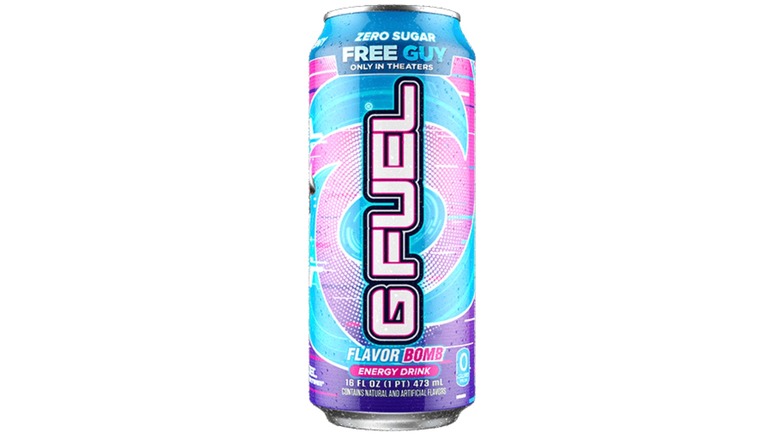Are G Fuel Energy Drinks Good For You?
The word "fuel" is right there in the name, and G Fuel energy drinks advertise their product as a means to keep you functioning like a "well-oiled machine." While the idea of fuel may initially conjure up images of thick chemical sludge, G Fuel is not about chemicals. In fact, G Fuel incorporates the use of natural ingredients in their products. The brand has become so trusted that professional athletes, models, and social media influencers alike have all come to swear by the energy, stamina, and focus benefits of G Fuel.
Within their wide variety of offerings, ShopaHolly ranks Ragin' Gummy Fish, Blue Chug Rug, and Candy among the top flavors. According to the brand's website, G Fuel comes without sugar and gluten, and it contains a host of B vitamins and antioxidants. However, a 16-ounce can of G Fuel does contain a high amount of caffeine, measuring in at 300 milligrams (via Reize Energy Drink).
The U.S. Food and Drug Administration (FDA) advises limiting caffeine intake to 400 milligrams a day for most healthy adults. With G Fuel ranking on the higher end of energy drink caffeine content, consuming more than one can will put you over the daily recommended limit, therefore increasing one's risk for negative side effects associated with overconsumption of caffeine.
How much G Fuel is too much in a day?
According to WebMD, ingesting excessive amounts of caffeine can induce an upset stomach, cause difficulty sleeping, rapid heart rate, chest pain, and can exacerbate symptoms of certain mental health disorders. In more severe cases, ingesting extremely high levels of caffeine can lead to death. Therefore, it's important to consume energy drinks mindfully and keep caffeine levels at a safe amount.
In addition to vitamins and minerals, G Fuel energy drinks also contain ingredients beneficial to our cognitive functioning. Tyrosine, for example, has been shown to boost memory and reduce stress-related sleep deprivation (via Healthline). However, in lieu of sugar, G Fuel cans do contain artificial sweeteners such as sucralose and acesulfame potassium. While FDA approved, some research suggests these artificial sweeteners pose potential health risks including impacts on insulin levels and gut health (via Medical News Today).
Whether you consume G Fuel as a ready-made drink or a powder product, representatives suggest that new drinkers begin with no more than a single serving a day. "Our recommended maximum daily dosage is 3 servings," the company continued.


